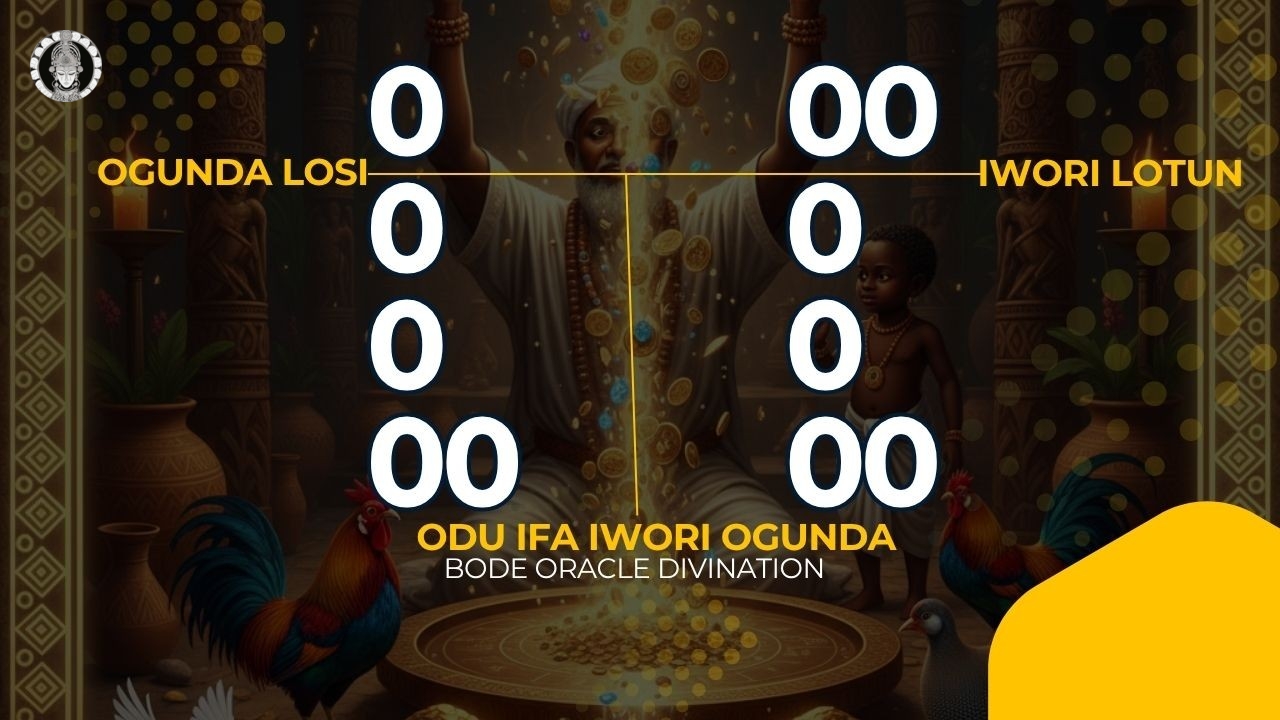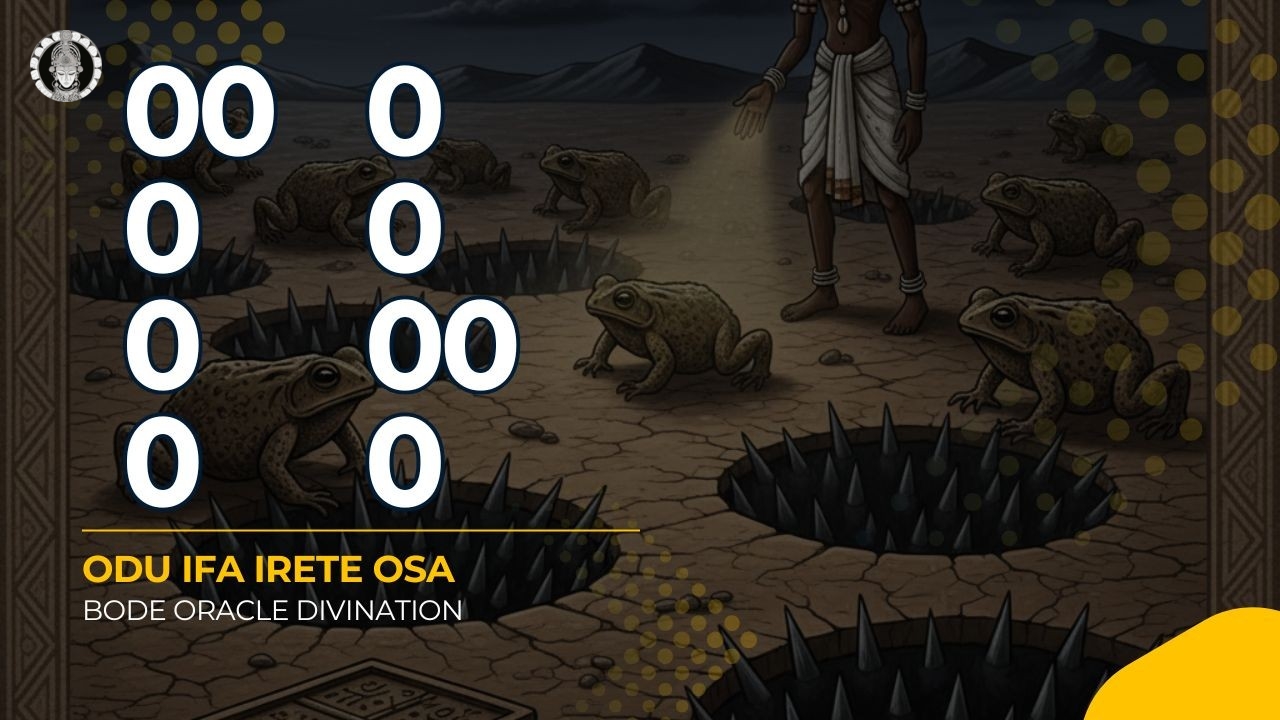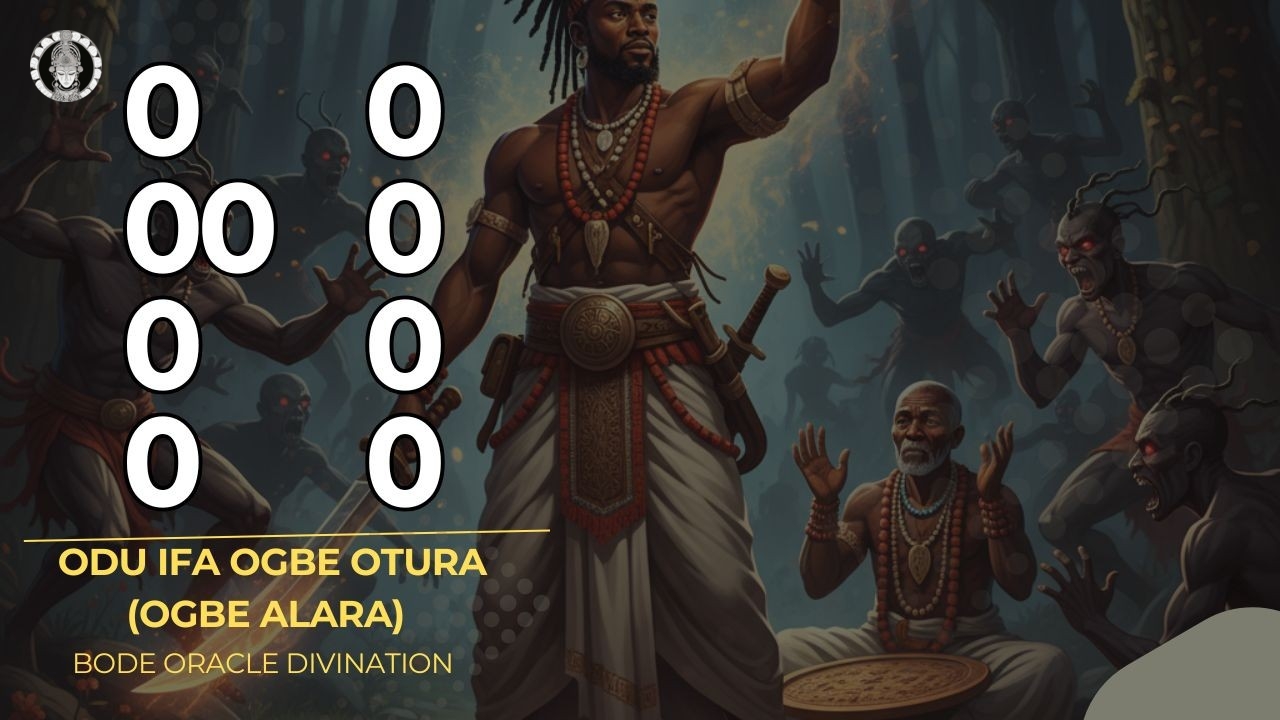Introduction to Odu Ifa Ogbe Otura (Ogbe Alara)
Odu Ifa Ogbe Otura, also known as Ogbe Alara or Ogbe Atura, represents one of the 256 sacred divination signs in the Ifa corpus. This powerful Odu carries essential messages about achieving victory over enemies through spiritual means, protection from multiple misfortunes that threaten to overwhelm, the remarkable transformation of false accusations into material prosperity, and maintaining spiritual purity to avoid negative experiences. Through the wisdom of Ogbe Otura, we learn that proper sacrifice combined with spiritual cleansing creates an impenetrable shield against opposition while opening channels for unexpected blessings.
The divinations within Ogbe Otura address crucial survival challenges: defeating those who seek our downfall, repelling forces of death and disease, turning slander into wealth, and preserving the spiritual protection afforded to those who serve the divine. Each story demonstrates that what appears as overwhelming opposition or accusation can be transformed through proper spiritual intervention into pathways for triumph and prosperity. For comprehensive understanding of the Ifa divination system and its role in Yoruba culture, explore documentation on this ancient wisdom tradition.
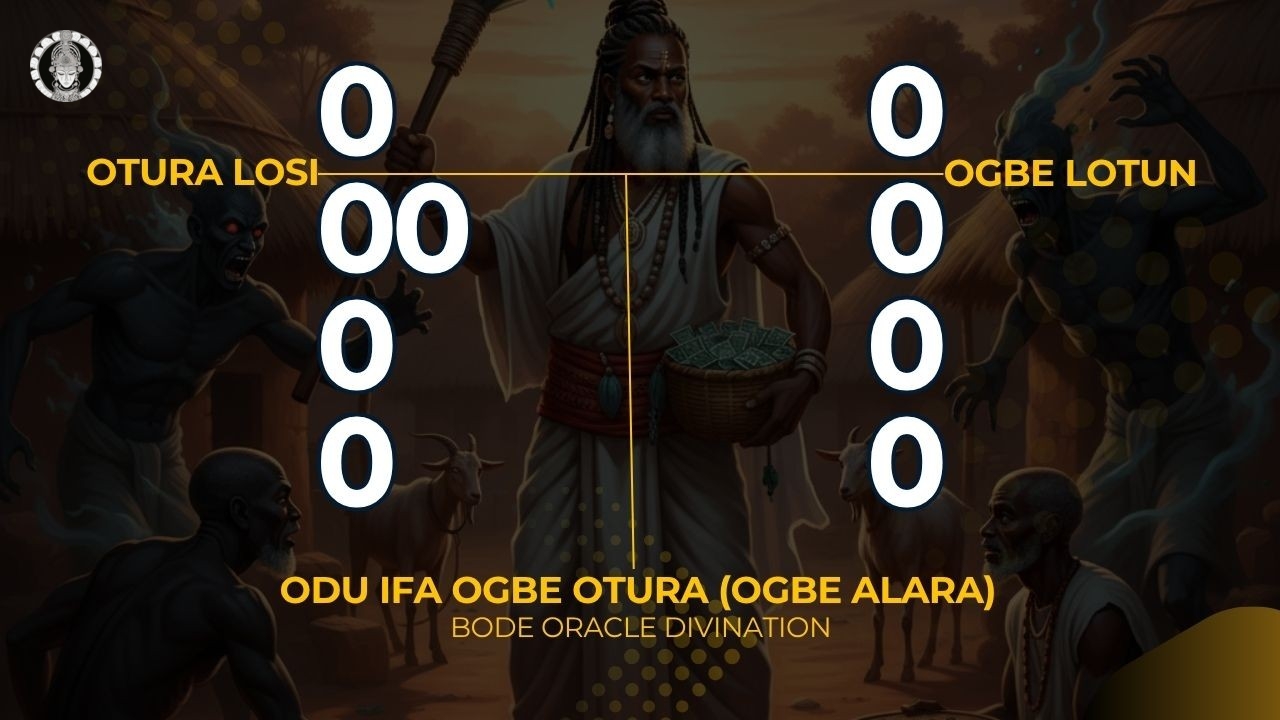
Ifa Divination for Ogbe: Achieving Victory Over Enemies
Understanding the Challenge of Opposition
This divination from Ogbe Otura addresses a universal human experience—having enemies who actively work against one's success and wellbeing. Ifa reveals that the person receiving this Odu is destined for blessings and fortune (ire), but these blessings are blocked by adversaries (ota). The opposition is real, organized, and potentially dangerous, requiring immediate spiritual intervention to overcome.
What makes this divination particularly significant is its promise of complete victory through relatively simple spiritual means. The verse demonstrates that the power to defeat enemies lies not in matching their hostility with equal aggression, but in activating spiritual forces through proper sacrifice and offerings to Ifa.
The Sacred Verse
Aja tuka agbarin
Adifafun ogbe ti o fi igo oti kan soso segun
Ebo won ni o se
O si gbebo nibe orubo
Kepe Kejinan
Ewa bani laruse ogun
Opa arusegun laba ni lese oba orisa.
English Translation
Aja tuka agbarin
This was the Ifa divination for Ogbe,
Who will triumph over his enemies with a bottle of victory.
He was advised to offer a sacrifice,
And he complied.
Not too late,
Nor too soon,
Come meet me in the blessing of victory.
It is through victory that we meet people at the feet
Of the king's side.
The Power of Wine as Spiritual Offering
The verse emphasizes that Ogbe achieved victory with just "a bottle of wine" (igo oti kan soso). This seemingly simple offering carries profound spiritual significance. Wine in Yoruba spirituality represents celebration, communion with divine forces, and the sweetening of one's destiny. When offered to Ifa, wine creates favorable spiritual conditions, invites blessings, and activates protective powers.
The specification of "one bottle" teaches an important principle: victory doesn't require extravagant sacrifices but proper ones. The quality of spiritual intention and compliance matters more than quantity. One bottle offered with faith and proper ritual procedures accomplishes what no amount of material wealth offered carelessly could achieve.
Divine Timing in Manifestation
The phrase "not too late, nor too soon" (Kepe Kejinan) reveals Ifa's wisdom about divine timing. When proper sacrifice is performed, victory manifests at exactly the right moment—not delayed to the point where the person suffers unnecessary harm, nor rushed to the point where lessons aren't learned or spiritual maturity isn't developed. This teaches trust in Ifa's timing while maintaining vigilance and continued spiritual practice.
Victory as Gateway to Influence
The concluding line—"It is through victory that we meet people at the feet of the king's side"—reveals that triumph over enemies serves a higher purpose than mere survival. Victory opens doors to positions of influence, access to authority figures, and recognition in places of power. The person who defeats their opposition through spiritual means demonstrates wisdom that attracts the attention and respect of leaders.
Meeting people "at the feet of the king" symbolizes being in corridors of power, having the ear of decision-makers, and operating in circles where important matters are determined. Victory over enemies isn't just defensive but positions the person for advancement and influence.
Prescribed Offerings (Ebo)
For victory over enemies, Ifa prescribes a rooster (akuko) and a significant amount of money (opolopo owo), along with wine (oti) to be offered to Ifa. The rooster represents authority, vigilance, and the announcement of victory. Money facilitates all necessary spiritual work and ensures the sacrifice is complete. The wine specifically offered to Ifa creates the spiritual sweetness that transforms bitter opposition into triumph.
Practical Application for Modern Times
In contemporary society, this Odu speaks to anyone facing opposition in business, career, relationships, or community affairs. Enemies may be competitors, jealous colleagues, hostile family members, or organized opposition to one's progress. The principle remains constant: spiritual victory through proper sacrifice defeats opposition more effectively than any physical confrontation or legal battle. The key is immediate compliance with Ifa's prescription before opposition gains further ground. Learn more about Ogbe Otura divination practices on our dedicated page.
Ifa Divination for Orunmila: Protection from Four Misfortunes
When Multiple Calamities Approach
This divination from Ogbe Otura addresses one of the most overwhelming spiritual situations—when not just one but multiple misfortunes (ajogun) are approaching simultaneously to attack a person's life and home. Ifa reveals that four different calamities have been sent (won ran ajogun merin wo silere), suggesting coordinated spiritual assault rather than random bad luck.
What makes this divination particularly powerful is that it was cast for Orunmila himself, the prophet and embodiment of Ifa wisdom. This demonstrates that even the most spiritually advanced individuals can face coordinated attacks from malevolent forces and must take active protective measures through sacrifice and spiritual cleansing.
The Sacred Verse
Asanko bialada
Apajuba bieledun
Eesun nikan ronini
Adifafun orunmila
Ti won ran ajogun merin wo silere
Ebo won ni ko se
O si gbebo nibe o rubo
Nje, iku paramo awo lo lode
Arun paramo awo lolode
Ewi fun alejo kolo e fi sasara bo agbo.
English Translation
Asanko Bialada,
Apajuba Bieledun,
Eesun Nikan Ronini.
This was the Ifa divination cast for Orunmila,
When four different troubles were sent to his home to disturb him.
He was advised to offer a sacrifice,
And he complied.
As a result, death and malevolent forces departed.
The priest is now in control.
Tell the strangers to leave.
Dip the broom in the herbal cleansing solution.
Understanding the Four Ajogun
The "four different troubles" (ajogun merin) represent major categories of misfortune that can devastate human life. While specific interpretations vary among Ifa lineages, these typically include death (iku), disease (arun), loss (ofo), and curse (epe). Some traditions also include affliction, litigation, and spiritual attack among the ajogun.
The fact that four came together indicates overwhelming assault designed to break down the person's defenses on multiple fronts simultaneously. When facing such coordinated attack, piecemeal responses prove insufficient—comprehensive spiritual intervention through proper sacrifice becomes necessary for survival and restoration of peace.
The Power of the Broom in Spiritual Cleansing
The prescription to include a broom (igbale) in the sacrifice carries profound significance. The verse instructs to "dip the broom in herbal cleansing solution" (e fi sasara bo agbo), indicating active spiritual cleansing rather than passive protection. The broom represents thorough removal of spiritual debris, sweeping away of negative forces, and purification of one's environment.
In Yoruba spiritual practice, the broom is not merely a cleaning tool but a spiritual instrument for driving away unwanted influences. When properly prepared with herbs and invocations, it becomes an extension of Ifa's power to clear space and create spiritual vacuum that malevolent forces cannot occupy.
Taking Authority Over Malevolent Forces
The outcome verse declares: "The priest is now in control. Tell the strangers to leave." This represents a complete reversal of power dynamics. What began as overwhelming assault by four misfortunes ends with the person in command, ordering malevolent forces to depart. The term "strangers" (alejo) for the ajogun emphasizes their lack of right to remain—they are uninvited guests who must leave when commanded by proper spiritual authority.
This teaches that proper sacrifice doesn't just protect defensively but transfers authority to the person, making them the one who determines what can and cannot enter their spiritual space. The victim becomes the victor, the attacked becomes the commander.
Death and Disease Departing
The verse specifically mentions that "death and malevolent forces departed" (iku paramo awo lo lode, arun paramo awo lolode). The use of "departed" rather than "were driven away" suggests they left voluntarily once proper spiritual conditions were established. This teaches that malevolent forces seek easy targets—when a person is properly fortified through sacrifice, these forces move on to find more vulnerable victims.
Prescribed Offerings (Ebo)
For protection from multiple misfortunes, Ifa prescribes a goat (oruko), a broom (igbale), and a significant amount of money (opolopo owo). The goat represents substitution and removal of spiritual debt. The broom facilitates active cleansing. Money ensures completeness of the sacrifice and supports all necessary spiritual work. Together, these items create comprehensive protection against coordinated spiritual assault.
Practical Application for Modern Times
In contemporary society, this Odu speaks to anyone experiencing multiple simultaneous crises—health problems combined with financial loss, relationship breakdown accompanied by legal troubles, or career setbacks coupled with family emergencies. When everything seems to go wrong at once, the cause may be spiritual rather than coincidental. The remedy involves comprehensive sacrifice and active spiritual cleansing to break the pattern and restore order. For deeper understanding of Yoruba spiritual systems, consult scholarly resources on African Traditional Religions and Ifa divination.
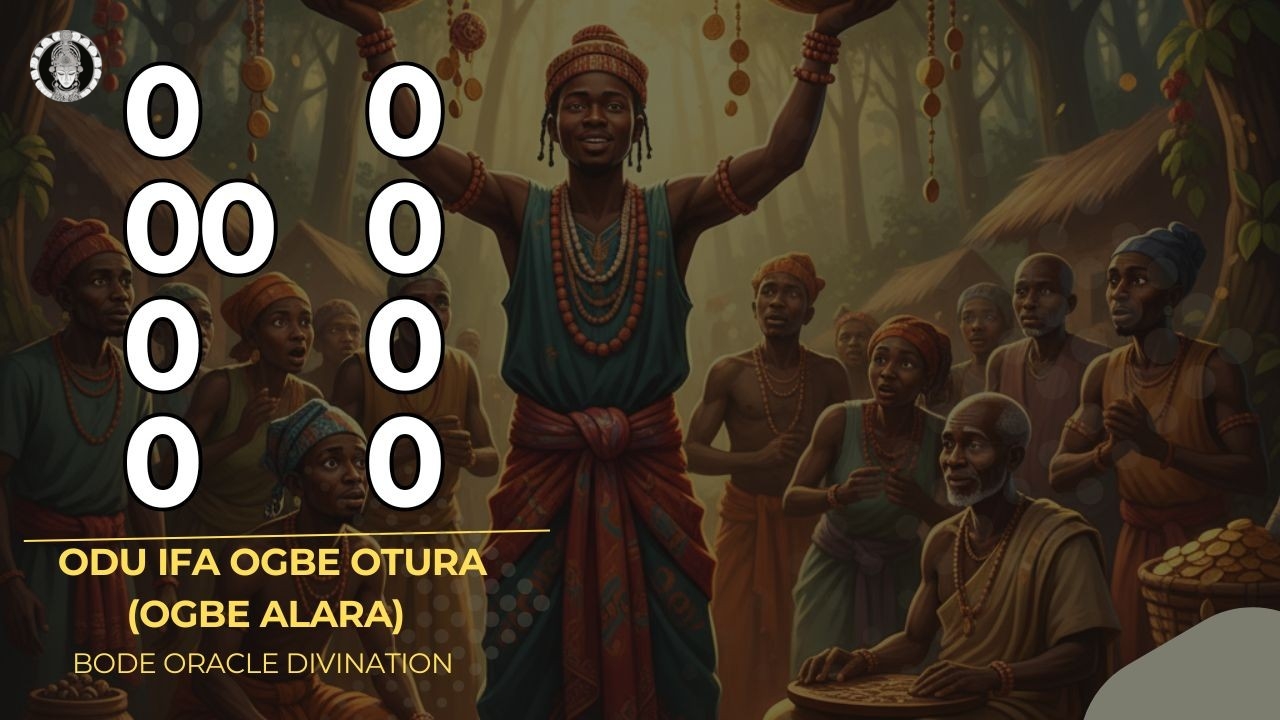
Ifa Divination for Jegbe: Transforming Accusations into Prosperity
When Your Truth Sounds Like Lies
This divination from Ogbe Otura addresses a peculiar and painful situation—when people accuse someone of lying even though they speak the truth. Ifa reveals that people are saying the person lies about their prospects, capabilities, or destiny (awon eyan manso pe irore po). These accusations damage reputation, create doubt, and potentially block opportunities that depend on trust and credibility.
What makes this divination remarkable is Ifa's promise that these very accusations—what people call lies—will ultimately transform into wealth and prosperity (iro re yo di ola). This teaches a profound truth: sometimes the path to blessing passes through misunderstanding, and what others reject becomes the foundation of future abundance.
The Sacred Verse
Ori omo sunhin baba omo
Adifafun jegbe
Tin re inu igbe lo he ire wale
Ebo won ni ose
O si gbebo nibe o rubo
Nje iro lodola niran wa
Eyin o wojegbe kuro kuro
Iro lodola niranwa.
English Translation
It is the child's destiny that brings blessings to the father.
This was the Ifa divination cast for Jegbe,
Who was going into the forest to gather the goodness of the home.
He was advised to offer a sacrifice,
And he complied.
We are the families that turn lies into wealth
Eyin o wojegbe kuro kuro
We are the families that turn lies into wealth
The Child's Destiny Blessing the Father
The opening line—"It is the child's destiny that brings blessings to the father" (Ori omo sunhin baba omo)—establishes a crucial principle about generational blessing. A child's successful fulfillment of their destiny doesn't just benefit them individually but reflects honor, wealth, and spiritual credit back to their parents and entire lineage.
This teaches that when we pursue our destiny despite opposition or misunderstanding, we're not just fighting for ourselves but for our family's honor and advancement. The accusations against Jegbe weren't just personal attacks but attempts to block blessings destined for his entire lineage. His compliance with Ifa's sacrifice protected not just himself but generations.
Going Into the Forest to Gather Blessings
The verse states that Jegbe was "going into the forest to gather the goodness of the home" (tin re inu igbe lo he ire wale). The forest (igbe) represents the unknown, the challenging, the place where ordinary people fear to venture. Yet it's precisely there that blessings (ire) await those courageous enough to seek them.
This metaphor teaches that prosperity often requires venturing into uncomfortable territories, taking paths others consider foolish, or pursuing visions that seem unrealistic to observers. What people call lies or fantasies may actually be accurate perceptions of blessings that exist in spiritual dimensions before manifesting physically. The person who speaks of these future realities before they're visible appears to be lying to those who lack spiritual vision.
The Alchemical Transformation: Lies into Wealth
The repeated refrain—"We are the families that turn lies into wealth" (iro lodola niran wa)—represents spiritual alchemy. This isn't endorsing dishonesty but recognizing that accusations of lying can be transformed into material prosperity when proper sacrifice is performed. The mechanism works through several spiritual principles:
First, false accusations create spiritual debt that the universe must balance by providing compensation in the form of wealth. Second, being misunderstood and rejected creates humility and character that position one for greater blessings than easy acceptance would have produced. Third, the energy people invest in speaking against someone paradoxically draws attention and eventual vindication when truth emerges.
Family Identity Through Spiritual Victory
The phrase "we are the families" (niran wa) indicates this transformation becomes a family identity and legacy. Jegbe's experience establishes a pattern—his descendants become known as those who turn accusations into prosperity, who transform slander into wealth. This creates spiritual precedent that protects future generations facing similar challenges.
When a family establishes a reputation for turning negative circumstances into blessings through proper spiritual practice, this reputation itself becomes spiritual capital that attracts divine favor and repels attacks that would devastate families lacking such spiritual pedigree.
Prescribed Offerings (Ebo)
For transforming accusations into prosperity, Ifa prescribes a dove (eyele), a rooster (akuko), and a significant amount of money (opolopo owo). The dove represents peace and the ability to rise above conflict without engaging in defensive arguments. The rooster represents the announcement of truth and the courage to maintain one's position despite opposition. Money facilitates the spiritual work and attracts more wealth through the principle of like attracting like.
Practical Application for Modern Times
In contemporary society, this Odu speaks to entrepreneurs called crazy for their visions, innovators dismissed as impractical dreamers, spiritual seekers accused of delusion, or anyone whose truth sounds too good to be believed. In the age of social media, accusations spread quickly and damage reputations broadly. However, Ifa teaches that when proper sacrifice accompanies unwavering commitment to one's truth, accusations become the very mechanism through which prosperity arrives. The key is refusing to shrink from one's vision to make others comfortable while performing the spiritual work that activates transformation.
Ifa Divination for Onidiku: Avoiding Misfortune Through Spiritual Purity
The Dual Nature of Spiritual Protection
This divination from Ogbe Otura addresses the delicate balance between attracting blessings and avoiding misfortunes. Ifa reveals that the person must perform sacrifice not only to receive good things (ki ojure komo bari ibi) but also to avoid experiencing evil (ki ojure kele mari ire). This dual prescription recognizes that protection and attraction are two sides of the same spiritual coin.
The divination was cast for Onidiku, whose name itself carries meaning—"oni" (owner/possessor) and "diku" (related to death or darkness). This suggests someone positioned at the boundary between light and darkness, life and death, who requires special spiritual protection due to their proximity to dangerous spiritual forces.
The Sacred Verse
Ididi kudi iwo lawo ile onidudu
Adifafun onidiku omo amejimojo awure
Ebo won ni ose
O si gbebo nibe orubo
Nje ididikudi lawo ile onidiku
Ifa moje ki oju omo irunmole o ribi
English Translation
"Ididi Kudi, you are the priest of the house of the Black."
This was the Ifa divination cast for Onidiku,
The child of Amejimojo Awure.
He was advised to offer a sacrifice,
And he complied.
Therefore, Ididi Kudi, you remain the priest of the house of Black.
Ifa, do not let the child of deities experience misfortune.
The Priest of the House of Black
The title "priest of the house of the Black" (awo ile onidudu) carries profound significance. In Yoruba cosmology, "black" or "darkness" doesn't necessarily mean evil but can represent mystery, depth, hidden knowledge, and the unseen spiritual realm. A priest of this house is someone who works with deep spiritual forces, navigates mysterious territories, and possesses knowledge others fear.
Such individuals require special protection precisely because their spiritual work exposes them to forces that could harm those lacking proper safeguards. Their service to the community in mediating between visible and invisible realms creates both privilege and vulnerability, requiring continuous spiritual maintenance through sacrifice.
The Significance of Efun and Osun
The prescription to include large quantities of efun (white chalk) and osun (red camwood powder) is particularly significant in this divination. These two sacred substances represent fundamental polarities and their necessary balance:
Efun (white chalk) represents purity, clarity, blessing, cooling forces, ancestral connection, and spiritual light. It's used to mark blessings, invoke protection, and establish spiritual cleanliness. In rituals, efun cools hot situations and brings peace.
Osun (red camwood) represents vitality, passion, protective heat, life force, and the power to attract good fortune. It marks authority, creates spiritual barriers against negative forces, and activates blessings. Osun energizes and empowers.
Together, efun and osun create spiritual equilibrium—cooling and heating, passive and active, receiving and projecting. Their inclusion in large quantities (opolopo) suggests the need for significant spiritual balancing to avoid misfortune while attracting blessings.
Child of Amejimojo Awure
Onidiku's lineage designation as "child of Amejimojo Awure" indicates descent from a line known for spiritual precision and fortune. "Amejimojo" suggests someone who knows things intimately or possesses deep knowledge, while "Awure" directly means "we seek blessings." This establishes that Onidiku comes from a family tradition of spiritual seekers and practitioners, making the protection even more critical—spiritual lineages attract both blessings and attacks.
Prayer for Children of Deities
The concluding prayer—"Ifa, do not let the child of deities experience misfortune" (Ifa moje ki oju omo irunmole o ribi)—recognizes a special category of people: those who serve spiritual forces (irunmole/orisa). The prayer acknowledges that spiritual workers who help others avoid misfortune deserve protection from the very evils they combat on behalf of their communities.
This prayer establishes reciprocity: just as Onidiku serves the spiritual realm and helps others through divination and ritual, so should the spiritual realm protect Onidiku from experiencing the misfortunes affecting those they help. It's a plea for professional immunity, spiritual worker's compensation, and divine recognition of service rendered.
Prescribed Offerings (Ebo)
For avoiding misfortune while receiving blessings, Ifa prescribes a rooster (akuko adie), large quantities of white chalk (opolopo efun), large quantities of red camwood powder (opolopo osun), and significant money (opolopo owo). The rooster provides vigilance and authority. The efun and osun create spiritual balance and purity. Money ensures completeness and attracts prosperity. Together, these items establish comprehensive protection for those who work in spiritually dangerous territories.
Practical Application for Modern Times
In contemporary society, this Odu speaks to spiritual practitioners, counselors, healers, and anyone whose work involves absorbing others' spiritual burdens or navigating dangerous spiritual territories. Healthcare workers, therapists, social workers, and clergy also fit this category—professionals exposed to suffering and evil who need protection to avoid absorbing what they encounter. The prescription remains relevant: maintain spiritual purity through regular cleansing, balance opposing forces, and seek protection from the spiritual realm you serve. For understanding the cultural and historical context of Ifa, explore UNESCO documentation on Ifa among the Yoruba people of Nigeria.
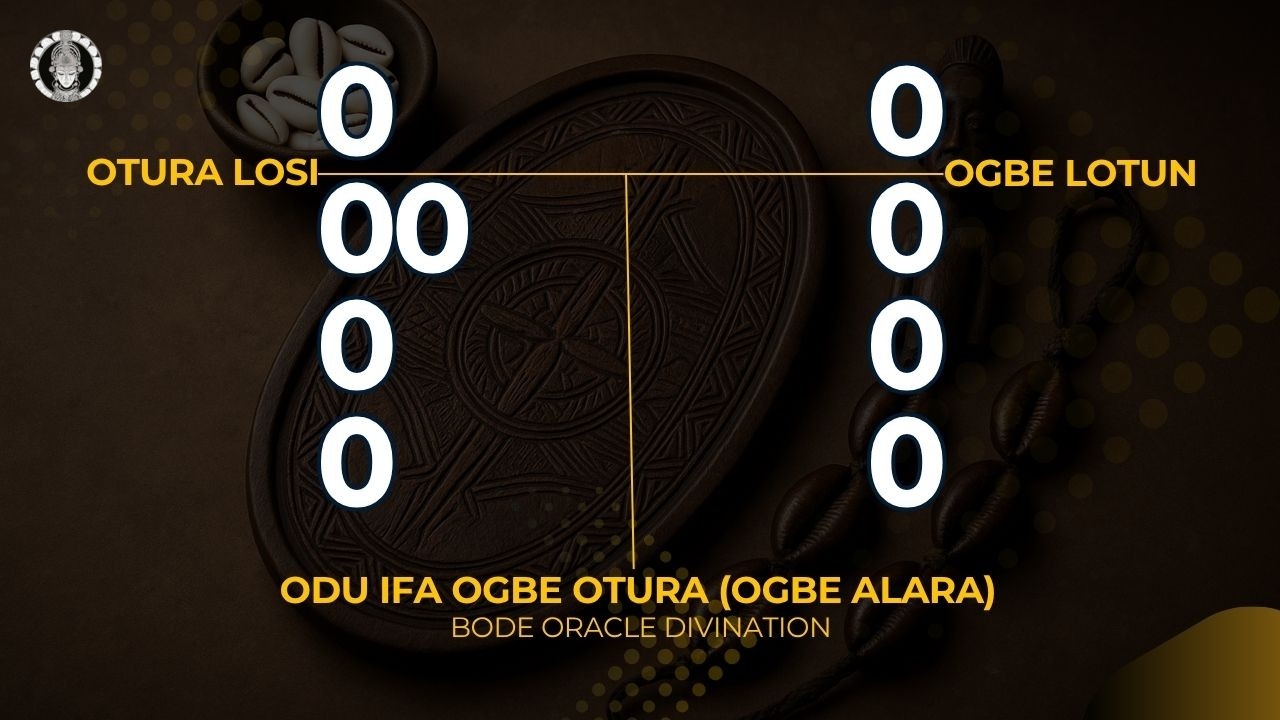
Additional Resources
Internal Links
- Complete Guide to Ogbe Otura - Detailed information, taboos, and practices
- Related Odu: Ogbe Odi Blog Post
- Bode.ng Blog - Extensive collection of Ifa and Yoruba spirituality articles
- Complete Odu Ifa Directory
- Bode.ng - Divination Services and Community
External Resources
- African Traditional Religions: Ifa Divination - Duquesne University
- Ifa Divination System - Wikipedia
- Ifa of the Yoruba People of Nigeria - UNESCO
- UNESCO Recognition of Ifa Divination System
- Algebraic Characterization of Ifa Main Divination Codes
- Opon Ifa - The Divination Tray
Connect With Us on Social Media
- BODE Oracle on TikTok
- BODE Oracle on YouTube
- BODE Oracle on Facebook
- BODE Oracle on X (Twitter)
- BODE Oracle on Pinterest
Visit Bode.ng to explore more divination teachings, participate in quizzes and polls, and connect with our community of practitioners and learners. Register today to access exclusive content and personalized guidance on your spiritual journey.
Frequently Asked Questions And Answers About Odu Ifa Ogbe Otura (Ogbe Alara)
Find answers to common questions about this sacred Odu Ifa and its divination teachings
Ogbe Otura, also called Ogbe Alara or Ogbe Atura, is one of the 256 sacred Odu (divination signs) in the Ifa corpus. It carries powerful messages about achieving victory over enemies, protection from multiple misfortunes (ajogun), transforming false accusations into prosperity, and maintaining spiritual purity. This Odu teaches that through proper sacrifice and spiritual cleansing, one can overcome opposition, repel evil forces, and turn negative circumstances into blessings.
The divination for Ogbe demonstrates that victory over enemies requires proper sacrifice and offerings to Ifa. The verse reveals that with just a bottle of wine (oti) offered to Ifa along with other prescribed items, one can achieve complete triumph over adversaries. The Odu emphasizes that victory comes through spiritual preparation rather than physical confrontation, and those who comply with Ifa's prescriptions meet with success at the feet of authority and leadership.
In the divination for Orunmila, Ogbe Otura warns of four different misfortunes (ajogun merin) approaching to disturb the person's home and life. While the specific names vary in interpretation, these typically represent death (iku), disease (arun), loss (ofo), and curse (epe). The divination prescribes sacrifice including a goat and broom to drive these forces away, demonstrating that proper spiritual intervention can prevent multiple calamities from taking root.
The divination for Jegbe teaches a profound truth: what others call lies or deception will ultimately become wealth and prosperity (iro lodola). This doesn't condone dishonesty but recognizes that sometimes people are falsely accused or misunderstood. When others claim the person is lying about their capabilities or prospects, Ifa reveals that these very accusations will transform into material blessings. The sacrifice ensures that misunderstanding becomes the pathway to abundance.
In the divination for Onidiku, Ifa specifically prescribes efun (white chalk) and osun (red camwood powder) as essential sacrificial items. Efun represents purity, clarity, blessing, and connection to ancestral forces. Osun represents vitality, protection, and the power to attract good fortune. Together, they create spiritual balance—white and red, cooling and warming, spiritual and physical. Their inclusion ensures that the person avoids misfortune and receives blessings in proper balance.
The first divination specifically mentions offering wine (oti) to Ifa as part of achieving victory. Wine in Yoruba spirituality represents celebration, communion with spiritual forces, and the sweetening of one's destiny. Offering wine to Ifa demonstrates respect, creates favorable spiritual conditions, and invites blessings. The verse emphasizes that with just one bottle of wine properly offered, complete victory over enemies becomes possible, showing the power of appropriate spiritual offerings.
In the divination for Orunmila, the broom (igbale) is prescribed as a sacrificial item for driving away the four misfortunes. The verse instructs to dip the broom in herbal cleansing solution and use it to sweep away evil forces. The broom represents thorough cleansing, removal of spiritual debris, and the sweeping away of unwanted influences. It symbolizes taking active spiritual action to clear one's space and life of negative forces, not just passively hoping they will leave.
The divination for Jegbe opens with the phrase 'It is the child's destiny that brings blessings to the father' (Ori omo sunhin baba omo). This teaches that children's spiritual destiny and success reflect back on their parents and lineage. When a child fulfills their destiny through proper spiritual practice, it brings honor, wealth, and blessings to the entire family line. This emphasizes the interconnected nature of family destiny in Yoruba spirituality.
The phrase 'It is through victory that we meet people at the feet of the king's side' teaches that success and triumph open doors to positions of influence and authority. Those who achieve victory over their challenges gain access to corridors of power and recognition. Meeting people at the king's feet symbolizes being in places of honor, having audience with authority figures, and receiving the respect that comes from demonstrated success.
The divination for Onidiku concludes with a prayer: 'Ifa, do not let the child of deities experience misfortune' (Ifa moje ki oju omo irunmole o ribi). This recognizes that those who follow spiritual paths (children of irunmole/deities) deserve special protection from misfortune. The prayer asks Ifa to shield spiritual practitioners from experiencing the very evils they help others overcome, acknowledging that spiritual workers need spiritual protection for their service.
All sacrifices (ebo) in Ogbe Otura should be performed under the guidance of a qualified Babalawo or Iyanifa. The priest ensures proper procedures, invokes necessary incantations, and prepares items correctly. Different divinations within Ogbe Otura require different offerings: victory needs wine and rooster, protection from misfortune needs goat and broom, transformation of accusations needs dove and rooster, avoiding misfortune needs rooster with efun and osun. The spiritual power comes from both materials and proper invocations.
You can explore comprehensive information about Ogbe Otura through several resources:
- Complete Guide to Ogbe Otura - Detailed taboos and practices
- Bode.ng Blog - Extensive articles on Ifa spirituality
- Complete Odu Ifa Directory
- Bode.ng - Access divination services and community resources
Connect with us on social media for regular teachings: TikTok, YouTube, Facebook, X (Twitter), and Pinterest @BODEOracle.
